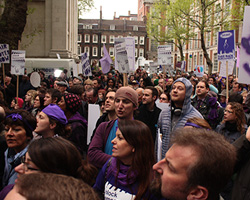

There are many types of ‘pressure groups’. Typically a pressure group is an organized group of people that wants to influence the policies or activities of those in able to make decisions. This could be at a local, national or international level of government.
Interest Groups such as Trade Unions seek to protect or advance the interests of their members. This means that membership is often limited to people who fit a certain occupation or position. People within the interest groups have a vested interest in that they want to benefit directly from any positive outcomes the group is able to achieve. Examples are the National Union of Teachers and National Famers Union (NFU)
Cause Groups are made up of people who share the same attitudes and beliefs and wish to advance the cause within those who make decisions around a certain subject. They are not looking for direct benefits e.g. better pay for their profession and membership is therefore much more open if you share the same attitude. Examples include Royal Society for Prevention of Cruelty to Animals (RSPCA) and Shelter a charity focused on tackling homelessness.
On the international stage these groups are also referred to as Non-Governmental Organisations (NGO’s) for example the Red Cross.
Broadly, there are two types of influences- those that sit close to Government and those that are at arms-length and therefore have perhaps less influence.
Although broadly speaking pressure groups sit outside the political system, there is often confusion or overlap between them. For example, although the UK Independence Party (UKIP) puts up candidates and wins at elections it has a narrow base – to get the UK out of the European Union (EU). Some pressure groups use elections as a means of gaining publicity and raising the profile for their issue.
